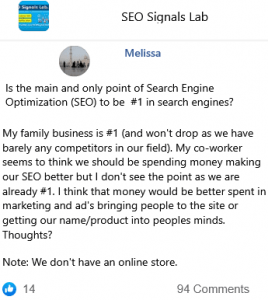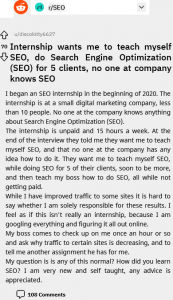tips for a recent college grad entering marketing field
hello! I wanted to ask what you're best advice would be for someone who is about to graduate college and is looking to pursue a successful career in marketing. if you could go back and tell your younger self one thing about marketing or done something different, would you have? looking for advice on:
• salaries
• work experience / qualifications (many of the entry-level jobs require at least 2 years of experience but i just graduated so (???))
• marketing roles (I'm leaning more towards research and analytics)
• how to grow and learn more
• work environment (stressful, healthy work life balance?)
literally ANY advice is so appreciated! thank you!!!
50 💬🗨
📰👈
Salaries and Jobs:
• Always save a little. Get in the habit of saving and investing. Not just the 401k match (if your employer does that), but add a little extra. It's always hard, but that's why it will be important. Everyone says this, but seriously do it.
• Starting salaries suck, but marketing increases quickly and has a very high ceiling. The fastest way to increase salary is to change jobs. Set your minimum requirements for changing. For me, I won't move unless a job is 30% better (pay, opportunity, team, and the work itself). Base that off of what is important to you, but don't just jump ship for 5% unless your whole company is dying or your boss sucks. In reality, most of my jumps have been > 50% increases, and usually I stay at a company for 3-4 years, which is enough time to learn and do enough to justify a 50% bump. Your first job will probably be much closer to 2 years (or less).
• Play the title game. Always try to move up at least a half title before you change jobs. For example, if you get hired as a senior associate (or whatever) try to get promoted to manager. Then when you change jobs, it's easy to hop get hired into a Senior Manager role (or negotiate for the title) and then get promoted to Director a year or two later. It's much harder to get hired as a Director if you are only a Senior Manager. Lots of benefits are tied to your level, so getting into Director+ gets you bigger bonus percentages, bigger share distributions, and a lot more pay.
• If you want to make money, technical and analytical marketing roles pay the best. Marketing Ops, MarTech, SalesOps, RevenueOps are all "easy" jobs that pay a ton. They just require a bit of technical knowhow on top of your marketing skills. Learn the hard things that nobody else wants to learn. And mostly, learn how to use data to do things better.
Career advice:
• The average tenure for a marketing manager is 24 months. The average tenure for a Chief Marketing Officer (CMO) is 40 months. It's not because people are getting fired. It's because good people are in high demand and can switch for more money. Make friends along the way, but don't feel bad leaving. This also means that even if you do have an excellent boss and mentor, they won't likely be around long enough to look after your career for you – you need to take care of it yourself. And it means that a coworker today might be Chief Marketing Officer (CMO) in a few years, so maintaining your reputation and connections to your peers can be very helpful.
• Agencies are an awesome (but challenging) way to start. I always say that you get 2-3 years of experience for each year at an agency. You move faster. You touch more things. You learn more. You get a lot more exposure to different problems and approaches. It's a great place to learn. But it's also very challenging for all those reasons, plus all the customer service side of it to support clients. Still, I see "agency experience preferred" on a large majority of marketing job postings (partly just because you'll need to know how to work with agencies, but partly because agency experience gives a ton of breadth.)
• Find a mentor, or even just more experienced people that you can talk to. Meetup groups and professional associations used to be awesome for this. I think I learned most of what I know just from informal conversations with other marketing nerds.
• Keep learning. Formally learning — classes, courses, certifications, etc. And informal – conferences, books, blogs, etc. Be intentional about learning. Also, start training now for how to manage others. Management is a skill that can be learned and taught, and is not something that you just magically absorb through time.
• I love recruiters. Getting a new job is 10x easier when you have someone advocating on your behalf. (And the company pays them, not you). Having a well built LinkedIn profile has been wonderful for my career since it makes it easy for recruiters to find me and mostly do all the work for me.
Worklife Balance
• You determine this much more than your company does. Part of it is just being diplomatic about it and good communication about what you need. In-house marketing teams tend to be very flexible (especially now), and a lot of that is just setting expectations and communicating changes. And sometimes you leave early and sometimes you stay late, but mostly you try to keep those in balance.
• Some industries are super seasonal, which means you might have challenges taking time off during those times. But others are pretty even. If your industry is killing you, switch.
• Working remote can be hard. Some tips: Don't make work the first or last thing you do in a day. Spend some time for yourself in the mornings and evenings, and try to minimize your work outside of normal hours. Communicate proactively – your team should never doubt what you're working on.
• Take all your vacation (or at least most of it)
• Have fun. And make friends. Maybe not "let's hang out every weekend and connect on Facebook" kind of friends, but if you are working with someone 2000 hours a year, at least try to have a bit of fun sometimes too.
Can you explain more on technical skills? Martech, SalesOps? Should I learn coding for that?
Right now I'm learning Power BI
• Salesforce Client Relationship Management (CRM) is the biggest one because it's so universal. They have free trailblazer courses to help learn, and their paid certifications are in very high demand. But you probably don't want to be just a Salesforce admin (that pays very good too though). If you don't have Salesforce at your company, you probably have Dynamics or Hubspot. Those are good too and will teach you a lot, but you'll want to learn Salesforce eventually.
• Marketing Automation platforms. Eloqua, Marketo, or Salesforce Marketing Cloud. Hubspot too as a free/cheap way in. (Hubspot's free courses and certifications are excellent btw).
• Analytics. Google analytics (free certs available from Google), adobe analytics, Salesforce reporting, etc. Being able to tie activities to revenue is huge (when appropriate – not everything should be tied to a revenue contribution number.) And dashboarding experience can be super helpful (tableau, Google data studio, power bi, etc)
• "Coding". HTML is required, at least enough to modify code but probably not enough to write from scratch. SQL can be helpful, at least this to pull and join data. APIs are super useful – all the systems above have Application Programming Interface (API) endpoints and you'll inevitably want to plug something into it. But mostly they all have "apps" that do the hard work and you just configure then, which is super easy.
• Campaign strategy – creating the ability to launch coherent campaigns that cross channels. So not just a flight of Facebook ads, but how does clicking those ads impact the experience in your site, on your first sales call, in terms of what emails or real mail you get, etc.
• Human skills – being able to work on projects very effectively with highly technical developers and analysts, AND being able to work with highly creative designers and marketers.
And lastly, to illustrate what I mean by "ops makes more money," a few weeks back Adobe posted two positions: a head of demand gen (VP level position) offering about $170k. And a director of marketing ops for $220k. One of those will be working very hard, and it's not the one that pays more.
So how to get started? Obviously you can't just hop into a job like this, since the tech stack alone may cost over $1M/year. Everyone's journey is different, but most tend to start in digital (ads, Pay Per Click (PPC), Search Engine Optimization (SEO)) and then move into email automation. Or as a web/content writer with some analytics interest and then moving into email automation. That's pretty easy. From there, it's learning how to do better automation and personalization (+dynamic segmentation and better triggers), not just blasting out a newsletter each month. Usually that leads deeper into all things Salesforce (Client Relationship Management (CRM)) and lots more reporting. From there, you start connecting more and more tools, change jobs once or twice, get some certifications, pick up some management experience, attend a few conferences, and you're good!
There are other flavors of this which means that different hard and soft skills may be needed, and varies a lot by company. I should probably add "project management" to all of them too.
Edit: I should add that there are some basic Ops/automation courses that are pretty good. I wouldn't pay for a boot camp (or maybe I would, but I haven't seen any great ones yet.) But there's lots of free courses and free certifications I'd recommend first (and all are already in the sidebar anyways)
Boult
Wow!! Thanks a ton!!!!
Pigghen
Marketer
Things I would give anything to tell my recently graduated self:
• apply for the jobs you don't qualify for every single time. Show them your gumption in cover letter and interview. This is how you grow.
• work your ass off, but do NOT give them your life. They do not care about you and you will get burnt out. Save above and beyond for very rare circumstances and you'll shine anyway.
• there is soooo much ego in marketing management. Try to find somewhere with a larger department when you're starting out, so that your workload is normal, and you only have to learn to wear one hat at a time.
• network ur little ass off, but don't expect a single thing to ever come from those connections. Do it to learn in the beginning and down the road those connections could pay dividends.
• don't specialize to start (maybe ever??) – it's easier to get hired as a Jack-of-all in my experience. And your job is easier when you understand what each interconnected dept is doing around you.
• always counter a salary offer and ask for more. 5-10% is a safe bet. Even if you don't think you deserve it, worst they can say is no.
• don't let your education "institutionalize" you. Yes you learned terms and methods, but sometimes it's just good old common sense that saves the day.
• stay away from that architecture firm. (Okay, this one's just for me. But it was a nightmare in that marketing dept I don't know I'll ever recover from lmao)
…. how did you know i am an undergrad studying marketing having interned for a construction firm and am looking at architecture firms
mind sharing ur experience? haha
Marketer
LOL. honestly it may be niche, I've only worked at one. It was a small, bi-coastal "international" firm under a (wannabe) Starchitect. There was NO middle management, only directors and juniors with a handful of "regular" architects.
The "marketing" team was two 35 year olds with MBAs playing "biz dev" and taking minor celebrities out for dinner to try and get them to build houses. They threw me in the deep end of social media, website, and Request for proposal (RFP)s – from research to design and execution, all of it. It was horrific being in marketing and googling international architectural laws, trying to ascertain the legality of our bidding work in other countries, all in service of the Big Guy's ego.
Long story short, it wasn't marketing. It was a biz/dev, sales, lead-Gen, social media manager, graphic design puke of a position. So I assume it must be in most companies in a rather ego driven field under 100 employees. I would consider doing it at a much larger firm with an appropriate department, because I think RFPs are interesting, but damn. I was gone in less than a year. Take what I'm saying with a grain of salt, but be very choosy when looking at firms!
A Marketing Company Commanded an Intern to Teach SEO for Them for Free
Should I go for an MBA or Marketing Degree to be an SEO Expert?
The 7 Fatal Mistakes an Entrepreneur Will Face
To Get the First Client in SEO
102 Best SEO Tips to Help You Drive Traffic This Year: Do Keyword Research, Hire Writers
Many SEO Jobs Require Years of Xp | People Want a Ph.D. Level of XP, but Never Let That Discourage You!
The Financial Level of SEO Experts







